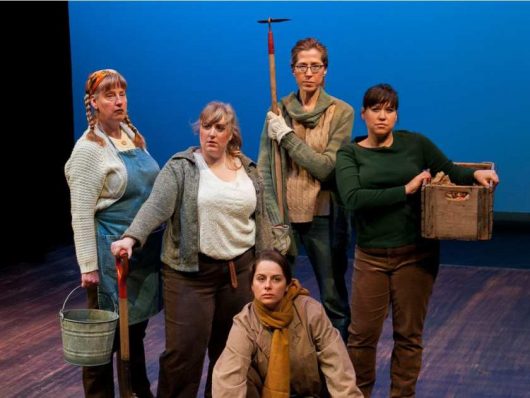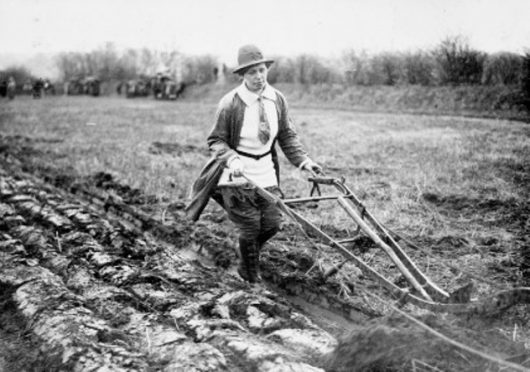REVIEW: Fen a bleak portrait of muddy misery
Posted on November 26, 2016 By Colin MacLean culture, Entertainment, Front Slider, Theatre
 In highly successful plays like Cloud 9 and Top Girls, English feminist playwright Caryl Churchill dramatically examines the abuse of power, sexual politics, women under duress and the evils of capitalism. She creates new forms and styles to present each of her plays – which often include humour and even farce.
In highly successful plays like Cloud 9 and Top Girls, English feminist playwright Caryl Churchill dramatically examines the abuse of power, sexual politics, women under duress and the evils of capitalism. She creates new forms and styles to present each of her plays – which often include humour and even farce.
There is not much in the way of humour in her 1983 play Fen – now in a new production from Edmonton’s adventurous Trunk Theatre and playing at the Varscona until Dec. 3. Churchill gives us a morose, impressionistic, class-conscious portrait of a land where hope has long since fled into the green fog that envelops both landscape and its inhabitants. The fen is a miserable place of rain-soaked, fog-shrouded English landscape where a gang of women are living a hardscrabble life.
The play is an unblinking look at their difficult lives and meagre dreams tied to an age old tradition that enslaves them from cradle to grave.
As usual, Churchill blends reality and theatricality, telling her saga through a series of intertwined stories. It’s confusing at first and the play takes its time to get going but when it does you do become involved.
From out of the rush of characters arises Val (Miranda Allen) who has left her husband and children to move in with her labourer lover but is tormented when finds she can’t leave either of them. Val’s life may be bleak but Allen lifts the play by giving her a considerable life force. Angela (Ellen Chorley) is a self-hating woman who finds a desperate outlet in tormenting her defenceless teenage stepdaughter, Becky (Monica Maddaford). In one particularly disturbing scene the two wound each another by composing doggerel that is alternately sadistic and suicidal. The stepmother explains that only by hurting her ward can she “feel something.”
 Other characters materialize out of the murky landscape. An owner sells off his inheritance to become a tenant on his own land. A centuries old ghost stalks a hated landowner from the other side of the grave. A hermaphrodite is tormented by three impudent children. One woman, a grandmother at 32, is caring for her daughter’s baby; and an elderly woman, deep in dementia, lives in a world of coffins and memories.
Other characters materialize out of the murky landscape. An owner sells off his inheritance to become a tenant on his own land. A centuries old ghost stalks a hated landowner from the other side of the grave. A hermaphrodite is tormented by three impudent children. One woman, a grandmother at 32, is caring for her daughter’s baby; and an elderly woman, deep in dementia, lives in a world of coffins and memories.
The bitterness of their lives creeps into everything, infecting even their personal relationships. Mothers abuse their children. Children abuse each other. Innocence is corrupted. Theatre buffs may be reminded of the works of Russian social realist Maxim Gorky.
Now, before I drive you away completely, Churchill is very much a product of our time – not of Gorky’s 19th Century (although the women, picking potatoes and gathering rocks out of a land they will never own, come across as modern-day serfs). The playwright sees one and all as helpless, exploited victims of a dehumanizing capitalistic system that callously keeps the poor in their lowly place and women can only escape by adopting that system’s most selfish, ruthless traits. They drink in a pub, gossip, take Valium, betray one another, go mad or just take their own lives. In a forlorn Baptist revival meeting one of the suffering congregation grinds out, ”We’re all rubbish but Jesus still loves us, so it’s all right.”
By the time you get to end of the play you may have had enough of these people. Or perhaps, inspired by Churchill’s passionate, eloquent, even poetic intensity, Amy DeFelice’s intelligent and expressive direction, perfectly capturing the writer’s intent, and the valiant efforts of her accomplished acting ensemble, you might find a final flicker in all that gloom as a ghost gazes across the suffocating green mist and sees – hope.
“The Earth is alive,” she offers.
Top photo by Mat Busby, Varscona Theatre













